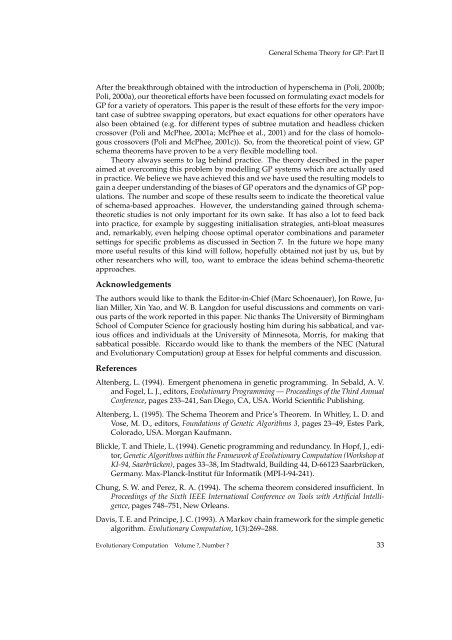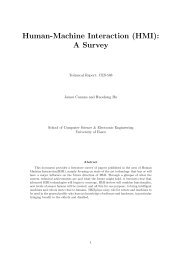General Schema Theory for Genetic Programming with Subtree ...
General Schema Theory for Genetic Programming with Subtree ...
General Schema Theory for Genetic Programming with Subtree ...
You also want an ePaper? Increase the reach of your titles
YUMPU automatically turns print PDFs into web optimized ePapers that Google loves.
<strong>General</strong> <strong>Schema</strong> <strong>Theory</strong> <strong>for</strong> GP: Part II<br />
After the breakthrough obtained <strong>with</strong> the introduction of hyperschema in (Poli, 2000b;<br />
Poli, 2000a), our theoretical ef<strong>for</strong>ts have been focussed on <strong>for</strong>mulating exact models <strong>for</strong><br />
GP <strong>for</strong> a variety of operators. This paper is the result of these ef<strong>for</strong>ts <strong>for</strong> the very important<br />
case of subtree swapping operators, but exact equations <strong>for</strong> other operators have<br />
also been obtained (e.g. <strong>for</strong> different types of subtree mutation and headless chicken<br />
crossover (Poli and McPhee, 2001a; McPhee et al., 2001) and <strong>for</strong> the class of homologous<br />
crossovers (Poli and McPhee, 2001c)). So, from the theoretical point of view, GP<br />
schema theorems have proven to be a very flexible modelling tool.<br />
<strong>Theory</strong> always seems to lag behind practice. The theory described in the paper<br />
aimed at overcoming this problem by modelling GP systems which are actually used<br />
in practice. We believe we have achieved this and we have used the resulting models to<br />
gain a deeper understanding of the biases of GP operators and the dynamics of GP populations.<br />
The number and scope of these results seem to indicate the theoretical value<br />
of schema-based approaches. However, the understanding gained through schematheoretic<br />
studies is not only important <strong>for</strong> its own sake. It has also a lot to feed back<br />
into practice, <strong>for</strong> example by suggesting initialisation strategies, anti-bloat measures<br />
and, remarkably, even helping choose optimal operator combinations and parameter<br />
settings <strong>for</strong> specific problems as discussed in Section 7. In the future we hope many<br />
more useful results of this kind will follow, hopefully obtained not just by us, but by<br />
other researchers who will, too, want to embrace the ideas behind schema-theoretic<br />
approaches.<br />
Acknowledgements<br />
The authors would like to thank the Editor-in-Chief (Marc Schoenauer), Jon Rowe, Julian<br />
Miller, Xin Yao, and W. B. Langdon <strong>for</strong> useful discussions and comments on various<br />
parts of the work reported in this paper. Nic thanks The University of Birmingham<br />
School of Computer Science <strong>for</strong> graciously hosting him during his sabbatical, and various<br />
offices and individuals at the University of Minnesota, Morris, <strong>for</strong> making that<br />
sabbatical possible. Riccardo would like to thank the members of the NEC (Natural<br />
and Evolutionary Computation) group at Essex <strong>for</strong> helpful comments and discussion.<br />
References<br />
Altenberg, L. (1994). Emergent phenomena in genetic programming. In Sebald, A. V.<br />
and Fogel, L. J., editors, Evolutionary <strong>Programming</strong> — Proceedings of the Third Annual<br />
Conference, pages 233–241, San Diego, CA, USA. World Scientific Publishing.<br />
Altenberg, L. (1995). The <strong>Schema</strong> Theorem and Price’s Theorem. In Whitley, L. D. and<br />
Vose, M. D., editors, Foundations of <strong>Genetic</strong> Algorithms 3, pages 23–49, Estes Park,<br />
Colorado, USA. Morgan Kaufmann.<br />
Blickle, T. and Thiele, L. (1994). <strong>Genetic</strong> programming and redundancy. In Hopf, J., editor,<br />
<strong>Genetic</strong> Algorithms <strong>with</strong>in the Framework of Evolutionary Computation (Workshop at<br />
KI-94, Saarbrücken), pages 33–38, Im Stadtwald, Building 44, D-66123 Saarbrücken,<br />
Germany. Max-Planck-Institut für In<strong>for</strong>matik (MPI-I-94-241).<br />
Chung, S. W. and Perez, R. A. (1994). The schema theorem considered insufficient. In<br />
Proceedings of the Sixth IEEE International Conference on Tools <strong>with</strong> Artificial Intelligence,<br />
pages 748–751, New Orleans.<br />
Davis, T. E. and Principe, J. C. (1993). A Markov chain framework <strong>for</strong> the simple genetic<br />
algorithm. Evolutionary Computation, 1(3):269–288.<br />
Evolutionary Computation Volume ?, Number ? 33




